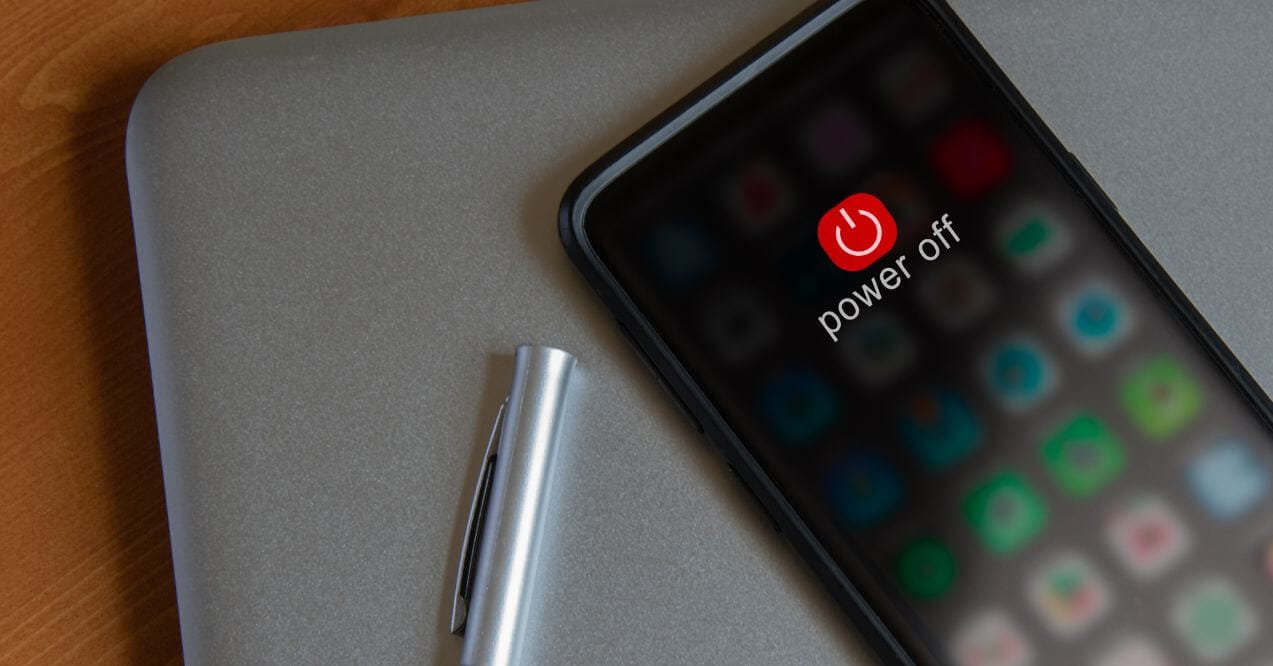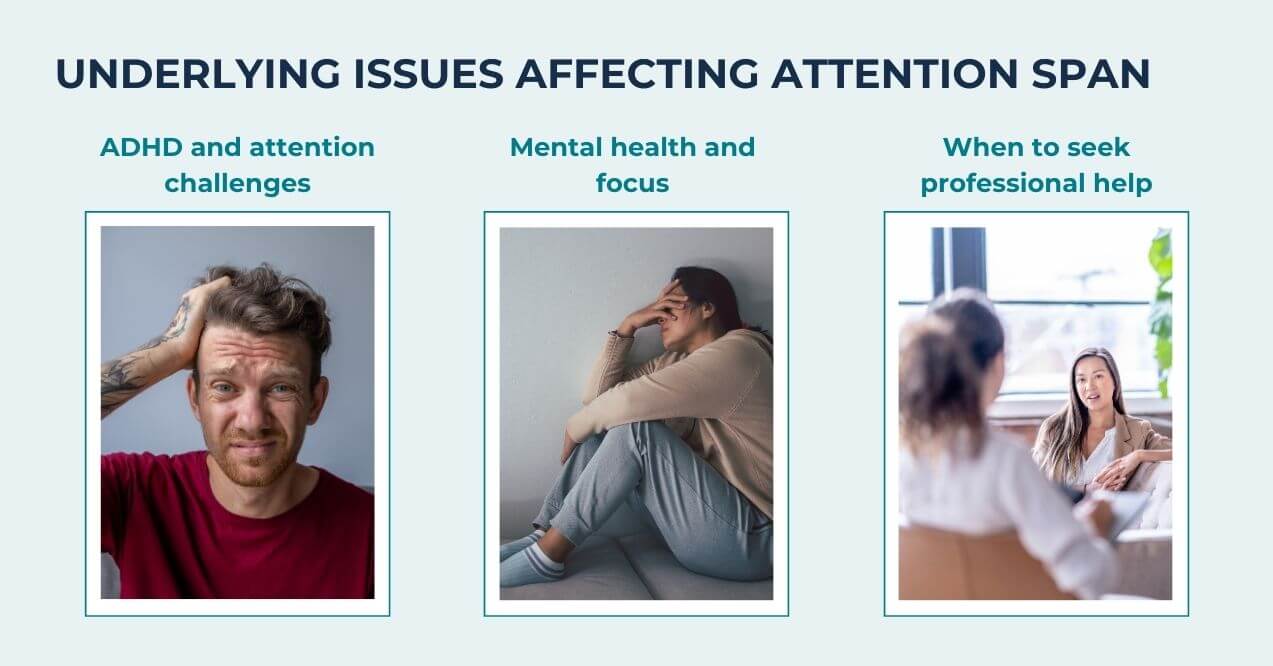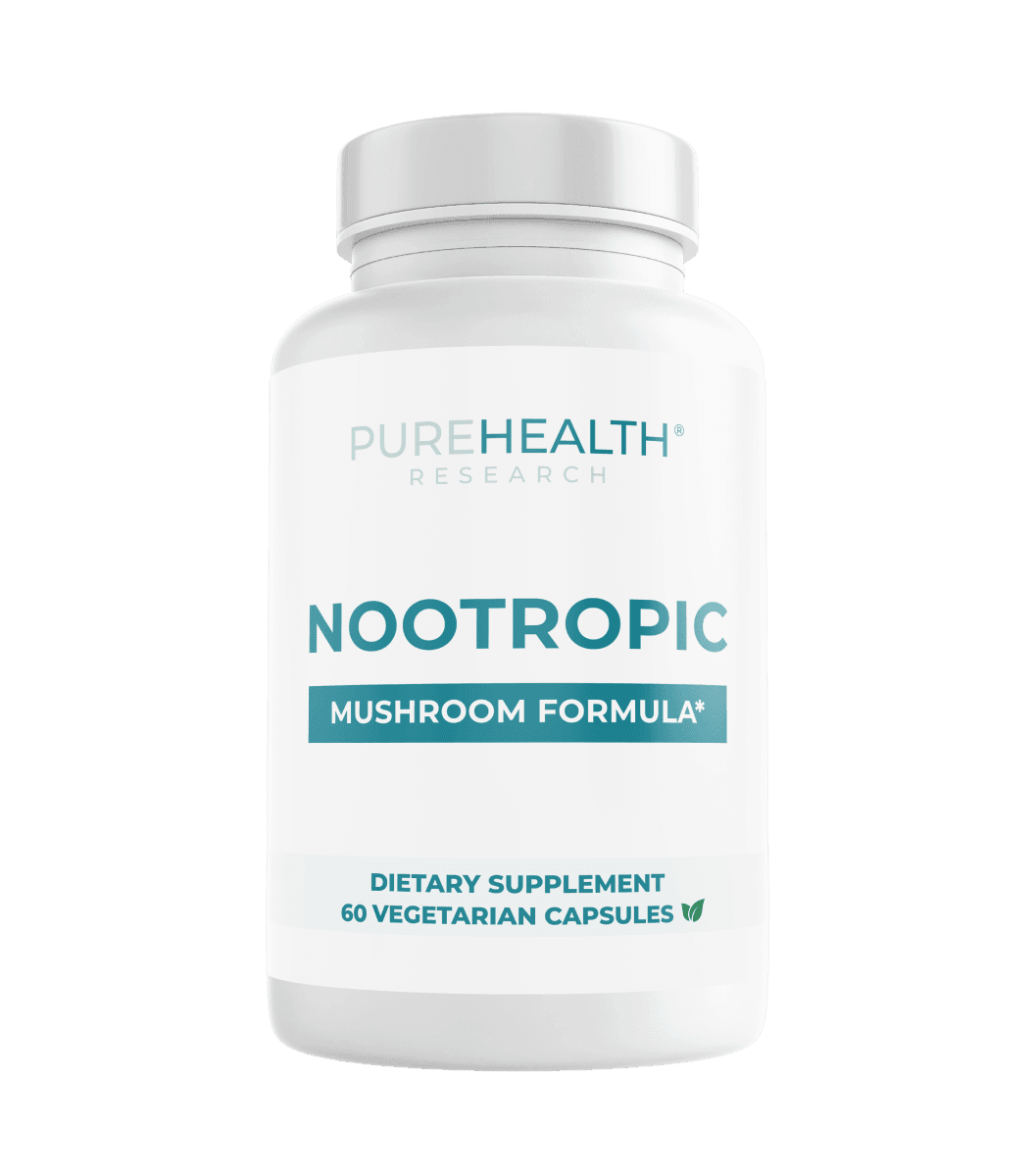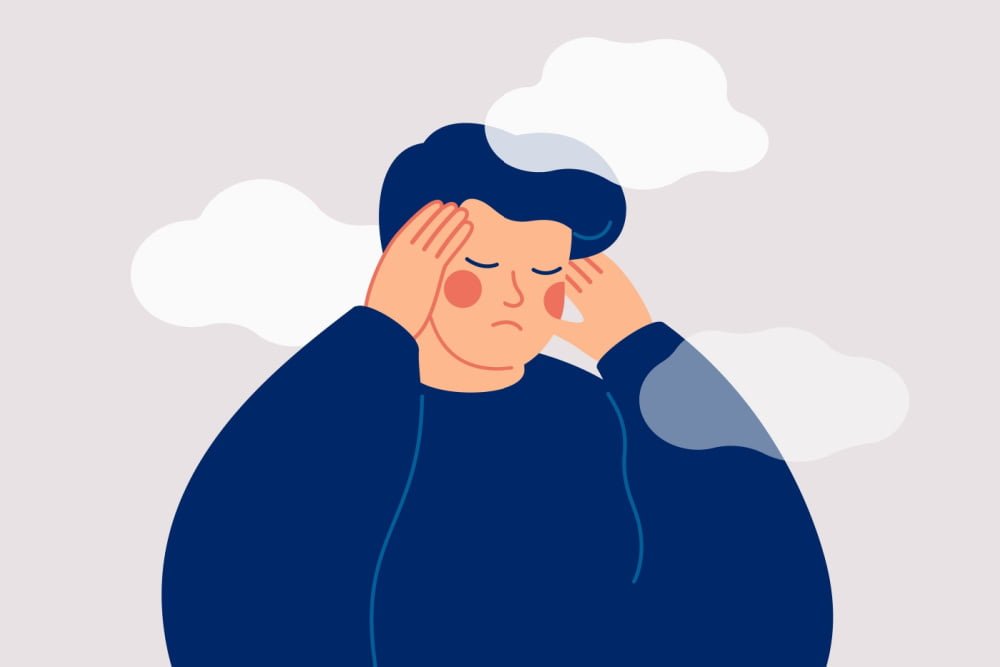How to Improve Your Attention Span: 6 Best Methods
Discover how to improve attention span with lifestyle tips, focus exercises, and advanced techniques to enhance your productivity.


In today’s fast-paced world, learning how to improve attention span has become essential for maintaining productivity and mental clarity. Whether it’s juggling work tasks, staying focused during conversations, or simply enjoying a good book, our ability to concentrate is constantly challenged by endless distractions.
This guide dives into proven methods that promote focus, strengthen cognitive endurance, and support mental agility. By understanding the underlying factors that affect attention span and exploring practical solutions, you can create a more mindful, focused version of yourself – ready to tackle the challenges of daily life with confidence.
What is Attention Span? And Why We Lose Focus?
Attention span refers to the amount of time you can focus on a task or activity without becoming distracted. It plays a vital role in daily life, supporting productivity, decision-making, and overall cognitive function. A strong attention span helps you complete tasks efficiently, stay engaged in conversations, and absorb new information effectively.
However, maintaining focus can be challenging due to both internal and external distractions. Internal factors like stress, anxiety, lack of sleep, and hunger can disrupt concentration, making it harder to stay attentive. External distractions, such as technology, social media, and noisy environments, further pull your attention away from what matters. These interruptions create a constant cycle of divided focus, which can lead to frustration and reduced performance.
Signs of a Short Attention Span
A short attention span can interfere with your productivity, relationships, and ability to stay mentally sharp. Recognizing the signs allows you to address the issue and adopt strategies to promote focus and mental clarity.
Here are some common indicators:
- Difficulty completing tasks – You may start multiple projects but struggle to finish them.
- Frequent daydreaming or zoning out – Losing track of time or getting distracted from your goals.
- Increased forgetfulness – Forgetting important details or failing to retain information.
- Feeling overwhelmed easily – Experiencing stress or frustration when juggling responsibilities.
- Impulsivity and restlessness – Quickly switching activities without fully engaging in any.
- Procrastination – Avoiding tasks that require sustained focus or effort.
- Difficulty maintaining focus during conversations or meetings – Struggling to stay attentive to others.
- Making careless mistakes – Missing details or committing errors due to lack of focus.
- Struggling to follow instructions – Forgetting steps or details when completing tasks.
- Feeling mentally fatigued or “scatterbrained” – Experiencing ongoing mental exhaustion.
Left unaddressed, these challenges can lead to frustration, reduced productivity, and feelings of inadequacy. Over time, a short attention span may even impact your ability to engage meaningfully with loved ones or achieve your goals.
How to Improve My Attention Span?
For those wondering how to improve attention span, adopting practical strategies can lead to noticeable improvements. Enhancing focus involves making conscious choices that support cognitive function and minimize distractions
1. Lifestyle Changes

Your daily habits significantly influence your ability to stay focused and maintain mental clarity. Simple yet impactful changes in sleep, exercise, and nutrition can create a strong foundation for improving your attention span.
- Sleep – Aim for 7-9 hours of quality sleep every night to support optimal brain function and refresh your mind.
- Exercise – Incorporate regular physical activity to enhance blood flow to the brain, boosting focus and cognitive performance.
- Nutrition – Prioritize a balanced diet filled with brain-boosting foods like fruits, vegetables, whole grains, and omega-3 fatty acids to nourish your mind and support sustained concentration. Additionally, consider incorporating supplements like ashwagandha and magnesium into your routine, which may help to improve focus.
If you want extra support for improving your attention span, consider Nootropic Mushroom Formula. This supplement is designed to promote brain health and focus with its blend of proven ingredients.
The formula contains meticulously chosen ingredients such Vitamin B which supports cognitive function and may help maintain healthy neurotransmitter activity. . The formula also includes Chaga Mushroom and Reishi Mushroom, often regarded as some of the best mushrooms for brain health due to their ability to support cognitive performance and reduce fatigue.
Pairing this supplement with healthy lifestyle changes can give your brain the support it needs to stay focused and sharp, even as you age.
2. Focus Exercises

Incorporating focus exercises into your daily routine can help train your brain to maintain attention for longer periods. These techniques are simple yet effective for reducing distractions and improving mental clarity. Regular practice strengthens your ability to stay present and concentrate on tasks.
- Meditation – Practice mindfulness meditation to develop present-moment awareness and train your attention. Even 5-10 minutes daily can make a difference.
- Deep Breathing – Use deep breathing exercises to calm your mind, reduce stress, and sharpen focus. Try inhaling deeply for four counts, holding for four, and exhaling for four.
- Progressive Muscle Relaxation – Focus on relaxing each muscle group in your body, starting from your toes and moving upward. This reduces tension and promotes better concentration.
3. Time Management

Effective time management is key for those wondering how to improve my attention span. By organizing your day and breaking tasks into manageable steps, you can reduce stress and improve focus. Incorporating structured routines helps minimize distractions and allows you to stay on track.
- Planning – Use a planner or digital calendar to schedule tasks and set priorities. This reduces feelings of overwhelm by giving you a clear roadmap for the day.
- Task Breakdown – Divide larger tasks into smaller, achievable steps. Tackling tasks one step at a time makes them less intimidating and keeps your attention focused.
- Single-tasking – Concentrate on one task at a time instead of multitasking. This approach prevents mental overload, increases productivity, and helps you stay engaged.
4. Changing Your Environment

Your environment plays a significant role in your ability to focus. Making small adjustments to your surroundings can help you create a space that supports attention and minimizes distractions.
- Workspace – Set up a dedicated workspace that is free from clutter and distractions. A clean, organized area helps reduce interruptions and keeps your mind focused on the task at hand.
- Music – Consider listening to calming music or white noise. These sounds can block out distracting background noises and promote a steady focus.
- Breaks – Schedule short, regular breaks throughout your day. Pausing for 5–10 minutes after a period of work helps prevent mental fatigue and allows you to reset your attention.
5. Addressing Specific Distractions

Managing specific distractions is crucial for maintaining focus and productivity. By identifying your main sources of interruptions, you can take intentional steps to minimize their impact and improve your ability to concentrate.
- Social Media – Limit your time on social media by setting boundaries, such as designated usage times. Turn off notifications and consider using website blockers to avoid temptation during work hours.
- Email – Schedule specific times to check and respond to emails instead of constantly monitoring your inbox. Turning off notifications can help you avoid unnecessary disruptions.
- Multitasking – Resist the urge to multitask, as it divides your attention and reduces efficiency. Focus on completing one task at a time and break larger projects into smaller, manageable steps to stay organized.
Benefits of an Improved Attention Span
Improving your attention span has wide-ranging benefits that can enhance your personal and professional life. Here are some of the key advantages:
- Increased productivity and efficiency – Complete tasks more effectively and in less time.
- Reduced stress and anxiety – Staying focused helps you feel in control and reduces mental clutter.
- Improved performance – Enhance your ability to absorb and apply new information in work or studies.
- Enhanced creativity and problem-solving – Concentration allows your brain to generate innovative ideas and solutions.
- Stronger relationships and communication skills – Be more present in conversations, fostering deeper connections with others.
- Greater enjoyment of activities and experiences – Fully engage in hobbies, books, or time with loved ones, improving your overall quality of life.
Addressing Underlying Issues Affecting Attention Span

Difficulty concentrating can sometimes be a sign of underlying conditions that need attention. Understanding and addressing these issues is crucial in learning how to fix attention span challenges.
ADHD and Attention Challenges
ADHD often impacts attention span, leading to difficulty concentrating, impulsivity, and restlessness. If you suspect ADHD, seeking a professional diagnosis is a crucial first step. Treatment options may include medication, therapy, or a combination of both, tailored to individual needs. Additionally, implementing strategies like organizational tools, structured routines, and effective time management can help manage symptoms and improve focus.
Mental Health and Focus
Mental health conditions like anxiety and depression are closely linked to attention span. Anxiety can make it hard to focus due to excessive worry, while depression can lead to mental fatigue and forgetfulness. Managing these conditions is vital for improving focus.
Techniques like mindfulness, deep breathing, and relaxation exercises can alleviate stress and support mental clarity. For persistent symptoms, seeking professional help is recommended to explore therapy or other appropriate interventions.
When to Seek Professional Help
Sometimes, attention issues persist despite lifestyle adjustments and focus exercises. Consider consulting a healthcare professional if:
- You experience persistent difficulty concentrating.
- Attention challenges significantly impact your daily life or work performance.
- You suspect an underlying medical or mental health condition.
By addressing underlying factors, you can create a personalized plan to improve your attention span and support long-term focus and productivity.
Advanced Techniques and Resources to Improve Attention Span
If you’re looking for targeted ways to improve attention span, advanced techniques and tools can help you focus better and stay productive.
Cognitive Behavioral Therapy (CBT) for Attention
CBT is a helpful method for managing attention challenges. It teaches you to recognize negative thought patterns and replace them with positive actions. For improving attention, CBT can guide you to break tasks into smaller steps, set achievable goals, and reduce distractions.
Working with a therapist, you’ll learn practical strategies to manage focus-related challenges, especially if stress, anxiety, or ADHD are factors. This approach provides structured support for developing long-lasting habits to improve concentration.
Digital Tools and Apps for Focus
Technology offers simple tools to help you concentrate and avoid distractions. Popular options include:
- Freedom – Blocks distracting websites and apps, keeping you focused.
- Forest – Encourages productivity by growing virtual trees as you focus on tasks.
- Headspace – Offers guided meditation sessions to improve mindfulness and attention.
These tools are easy to use and customizable, making them great for staying on track and managing distractions. Pairing CBT with these resources creates a balanced approach to support better focus and long-term attention span improvement.
Final Thoughts
Improving your focus is essential in today’s distraction-filled world. This guide has explored practical strategies and advanced techniques on how to improve attention span, from making lifestyle changes and practicing focus exercises to managing distractions and addressing underlying issues. For additional support, one of the best supplements for brain and mental health like Nootropic Mushroom Formula can complement these efforts. By incorporating these methods into your daily routine, you can enhance productivity, reduce stress, and enjoy greater clarity and purpose. Start applying these steps today to create a more focused and fulfilling life.
Attention problems related to ADHD often include impulsivity, hyperactivity, and persistent difficulty focusing despite effort. If these challenges significantly impact daily life, consult a healthcare professional for a proper evaluation and personalized guidance.
Start by practicing mindfulness meditation for 5–10 minutes daily. Focus on your breath, observe your surroundings, and avoid judgment. Gradually incorporate mindfulness into everyday activities like eating, walking, or listening to improve attention and presence.
Most adults need 7–9 hours of quality sleep per night. Prioritize consistent sleep schedules and a relaxing bedtime routine to support cognitive function, memory retention, and focus throughout the day.
It depends on your preferences and tasks. Calming music or white noise can block distractions for some, while silence suits others needing full concentration. Experiment to find what enhances your focus best during work.
Yes, regular exercise improves blood flow to the brain, boosts energy, and enhances cognitive function. Activities like walking, yoga, or strength training support better focus, memory, and attention over time.
Sign up for our Healthy Living newsletter!
Advertisement. This site offers health, wellness, fitness and nutritional information and is designed for educational purposes only. You should not rely on this information as a substitute for, nor does it replace, professional medical advice, diagnosis, or treatment. If you have any concerns or questions about your health, you should always consult with a physician or other health-care professional. Do not disregard, avoid or delay obtaining medical or health related advice from your health-care professional because of something you may have read on this site. The use of any information provided on this site is solely at your own risk.










